Main Past Perfect Takeaways:
- The past perfect tense is also called the pluperfect.
- Form the past perfect with the formula had + past participle.
- Make past perfect negative with the formula had + not + past participle.
- If you aren’t describing a sequence of events, avoid this tense
- Past perfect tense helps clarify a timeframe more than simple perfect tense.
- Use past perfect when describing a point in the past or an event that happened before something else.
- Use past perfect when expressing a condition, also known as the if-clause.
What is Past Perfect Tense?
Sometimes verbs are confusing when they express timeframes, but past perfecttense or pluperfect gives more clarity. It expresses something that happened at a previous point in time. Ensure your audience understands exactly what happened when with this verb tense. Form Past perfect by combining the past tense of the verb “to have,” with the past participle of the main verb. It often appears with the word “already.”
What is the Structure of Past Perfect Tense?
Past perfecttense involves a subject, the word had, and the past participle of a verb. Past perfect formula: subject + had + past participle = past perfect tense.
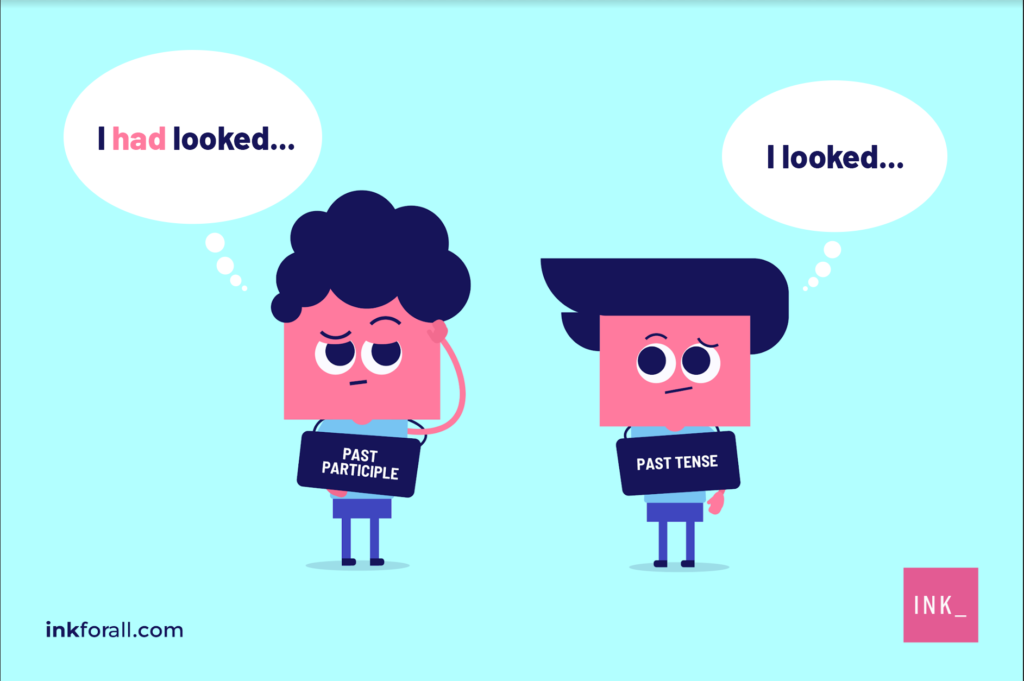

Let’s break everything down with this pluperfect example:
Lucyis the subject.
Hadis the past tense version of “to have.”
Requested is the past participle of the verb request.
You can verify this by asking yourself what happened first. Did Lucy order a gluten-free sandwich first, or did the chef give her a whole-wheat bun first?
The word hadindicated that Lucy ordered her sandwich before receiving the wrong item.
Writers don’t always use had at the beginning of a sentence. However, past perfecttense still shows an event that happened before another event.
Here’s another example of pluperfect tense:
Tough luck for John’s ex here. This sentence shows John moved on before she confessed her love. This is evident even though hadappears in the second part of the sentence rather than the first.
Where Do We Use Past Perfect?
Use past perfect tense in the part of the sentence that contains the if-clause. This part of the sentence explains the condition. Most of the time, writers use this verb tense to show that it took place before other things happened in the sentence. Past perfect makes this difference clear with “had” (had gone) while the other actions in the sentence use the simple past tense (went).
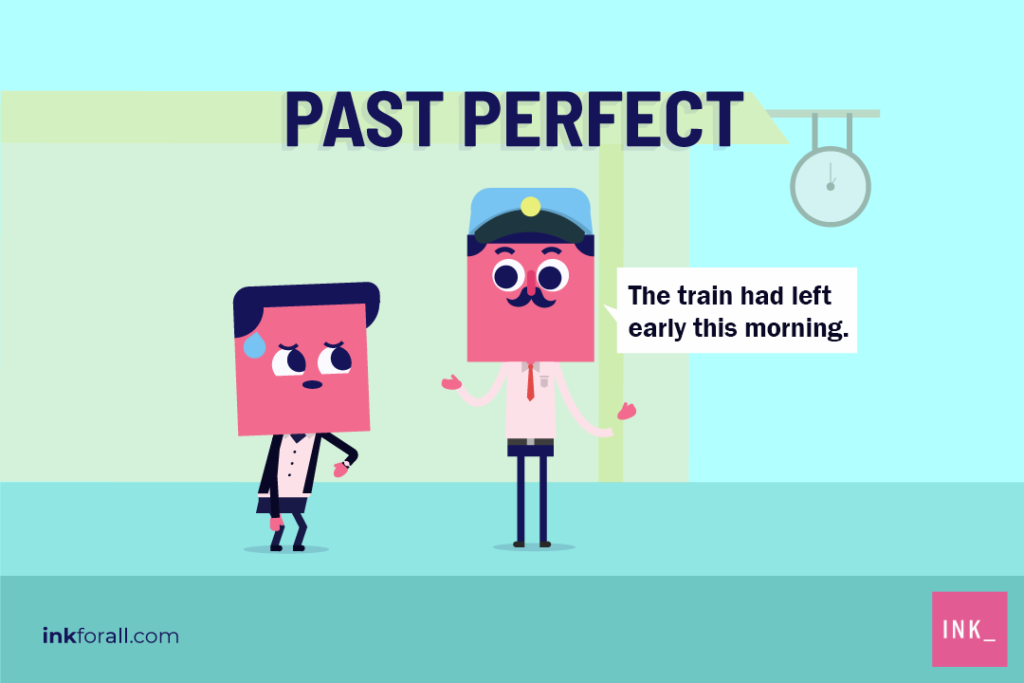

Take a look at these examples of pluperfect . These examples all follow the formula referenced earlier: subject + had + past participle =past perfecttense.
When Shouldn’t You Use Past Perfect Tense?
Avoid past perfect tense when you aren’t referencing a sequence of events. Inserting had unnecessarily is a common error people make in written and verbal communication.
Let’s say you came home and discovered someone stole your Amazon package. You stomped over to your neighbor’s house and vented about the situation. What should you say?
You don’t need to include had in your sentence. Unless you’re telling your neighbor what you did before or after you noticed the package was missing.


What is the Difference Between Past Tense and Past Perfect?
While both past simple and past perfect tenses describe events that happened at a previous time, they have different functions. We use the simple past tense of a verb when describing a single event that happened in the past. For instance:
We also use simple past to describe past events in the order in which they occurred. See example below:
On the other hand, we use the past perfect tense of a verb to sequence events in the past and show which event happened first. Consider the following examples:
In addition, the past simple expresses a stronger connection between the time of two or more events, as opposed to past perfect.
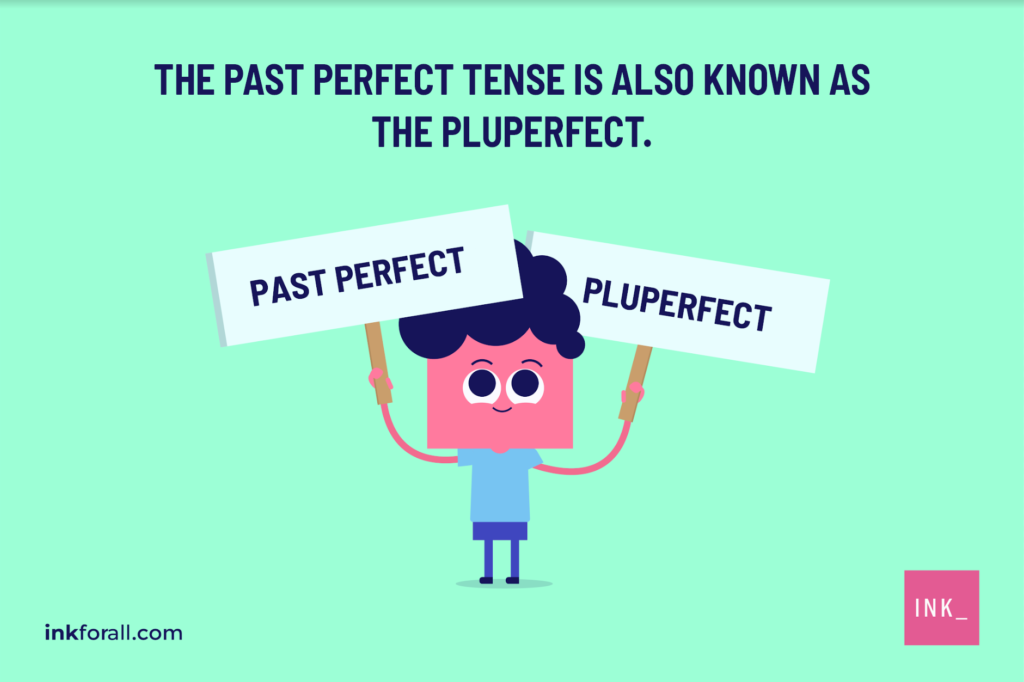

How Do You Make Past Perfect Negative?
Add notbetween the word hadand your past participle. Use the formula had + not + past participle.
We can’t make your past less confusing, but we can help you describe it with clarity. Remember the tips above, whether you’re using pluperfect, past simple, or past perfect negative.
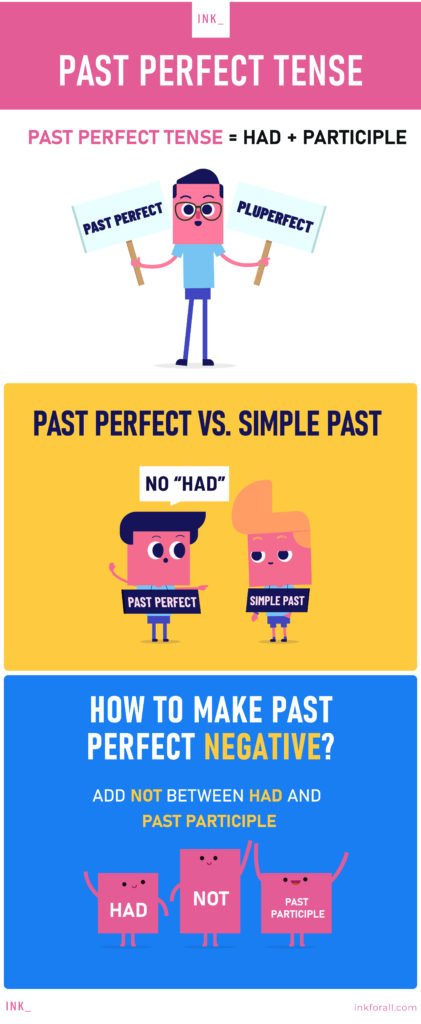

Common Regular Verbs in Their Past Perfect, Infinitive, and Negative Forms
Simple Present
abate adjust abduct bag bait calculate call dazzle edit educate fade fail glaze glue halt hammer ignite ignore join joke kiss knit lessen levitate maintain nab nail obtain occupy offend pair pamper parade sacrifice satisfy tangle tarnish unbox validate veil wallow wander yap yelp yield zest zigzag
Simple Past
abated adjusted abducted bagged baited calculated called dazzled edited educated faded failed glazed glued halted hammered ignited ignored joined joked kissed knitted lessened levitated maintained nabbed nailed obtained occupied offended paired pampered paraded sacrificed satisfied tangled tarnished unboxed validated veiled wallowed wandered yapped yelped yielded zested zigzagged
Past Perfect
had abated had adjusted had abducted had bagged had baited had calculated had called had dazzled had edited had educated had faded had failed had glazed had glued had halted had hammered had ignited had ignored had joined had joked had kissed had knitted had lessened had levitated had maintained had nabbed had nailed had obtained had occupied had offended had paired had pampered had paraded had sacrificed had satisfied had tangled had tarnished had unboxed had validated had veiled had wallowed had wandered had yapped had yelped had yielded had zested had zigzagged
Infinitive
to abate to adjust to abduct to bag to bait to calculate to call to dazzle to edit to educate to fade to fail to glaze to glue to halt to hammer to ignite to ignore to join to joke to kiss to knit to lessen to levitate to maintain to nab to nail to obtain to occupy to offend to pair to pamper to parade to sacrifice to satisfy to tangle to tarnish to unbox to validate to veil to wallow to wander to yap to yelp to yield to zest to zigzag
Negative
had not abated had not adjusted had not abducted had not bagged had not baited had not calculated had not called had not dazzled had not edited had not educated had not faded had not failed had not glazed had not glued had not halted had not hammered had not ignited had not ignored had not joined had not joked had not kissed had not knitted had not lessened had not levitated had not maintained had not nabbed had not nailed had not obtained had not occupied had not offended had not paired had not pampered had not paraded had not sacrificed had not satisfied had not tangled had not tarnished had not unboxed had not validated had not veiled had not wallowed had not wandered had not yapped had not yelped had not yielded had not zested had not zigzagged
Common Irregular Verbs in Their Past Perfect, Infinitive, and Negative Forms
Simple Present
awake befall buy behold bend catch creep dealt dig do feed flee forbid go grind hurt hear interweave intertwine keep kneel know leave lie lose make meet misdeal mislead outgrow outsell outspeak partake prebuild rebuild redo seek shake thrive throw unbind undo weep win wring withdraw withhold withstand
Simple Past
awoken befell bought beheld bent caught crept dealt dug did fed fled forbade went ground hurt heard interwove intertwined kept knelt knew left lied lost made met misdealt misled outgrew outsold outspoke partook prebuilt rebuilt redid sought shook thrived threw unbound undid wept won wrung withdrew withheld withstood
Past Perfect
had awoken had befell had bought had beheld had bent had caught had crept had dealt had dug had done had fed had fled had forbade had gone had ground had hurt had heard had interwoven had intertwined had kept had knelt had known had left had lied had lost had made had met had misdealt had misled had outgrew had outsold had outspoken had partaken had prebuilt had rebuilt had redone had sought had shaken had thrived had thrown had unbound had undone had wept had won had wrung had withdrawn had withheld had withstood
Infinitive
to awake to befall to buy to behold to bend to catch to creep to deal to dig to do to feed to flee to forbid to go to grind to hurt to hear to interweave to intertwine to keep to kneel to know to leave to lie to lose to make to meet to misdeal to mislead to outgrow to outsell to outspeak to partake to prebuild to rebuild to redo to seek to shake to thrive to throw to unbind to undo to weep to win to wring to withdraw to withhold to withstand
Negative
had not awoken had not befell had not bought had not beheld had not bent had not caught had not crept had not dealt had not dug had not done had not fed had not fled had not forbade had not gone had not ground had not hurt had not heard had not interwoven had not intertwined had not kept had not knelt had not known had not left had not lied had not lost had not made had not met had not misdealt had not misled had not outgrew had not outsold had not outspoken had not partaken had not prebuilt had not rebuilt had not redone had not sought had not shaken had not thrived had not thrown had not unbound had not undone had not wept had not won had not wrung had not withdrawn had not withheld had not withstood
Quick Pluperfect Quiz to Test Your Knowledge
Past Perfect Tense Question #1
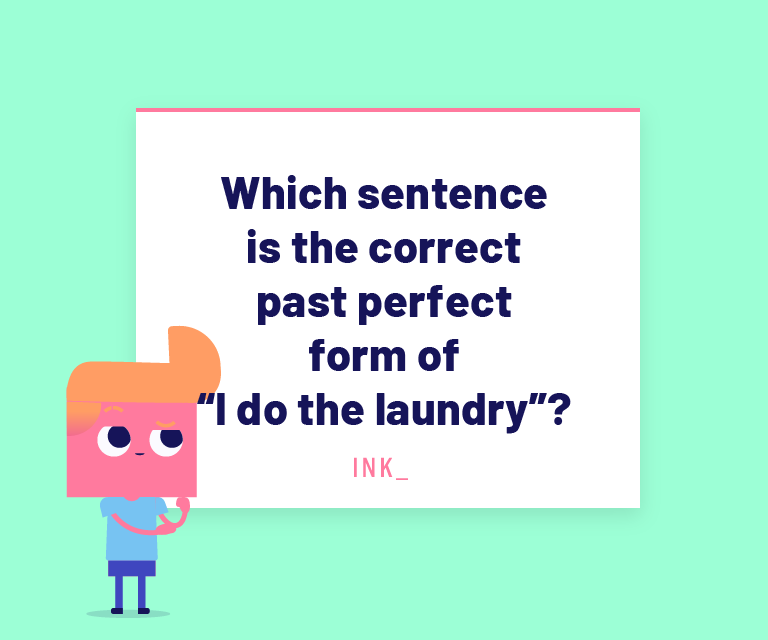

The answer is C. The formula for creating a past perfect is subject + had + past participle.
Past Perfect Tense Question #2
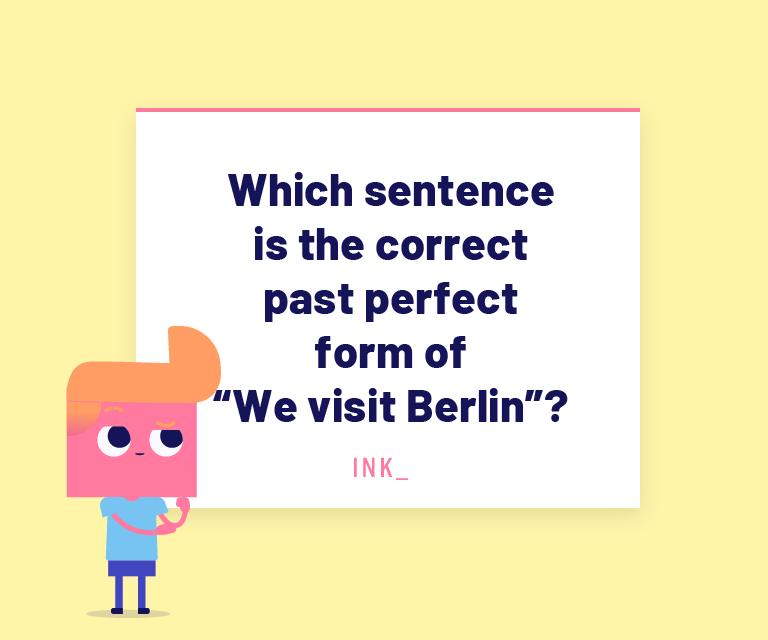

The answer is A. The formula for creating a past perfect is subject + had + past participle.
Past Perfect Tense Question #3
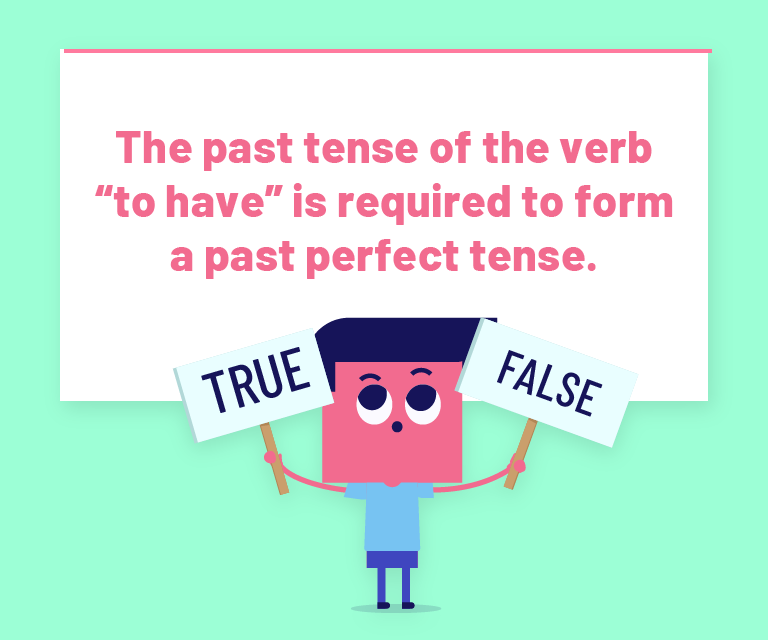

The answer is TRUE. To form a past perfect, combine the past tense of the verb "to have," which is had, with the past participle of the main verb.
Past Perfect Tense Question #4
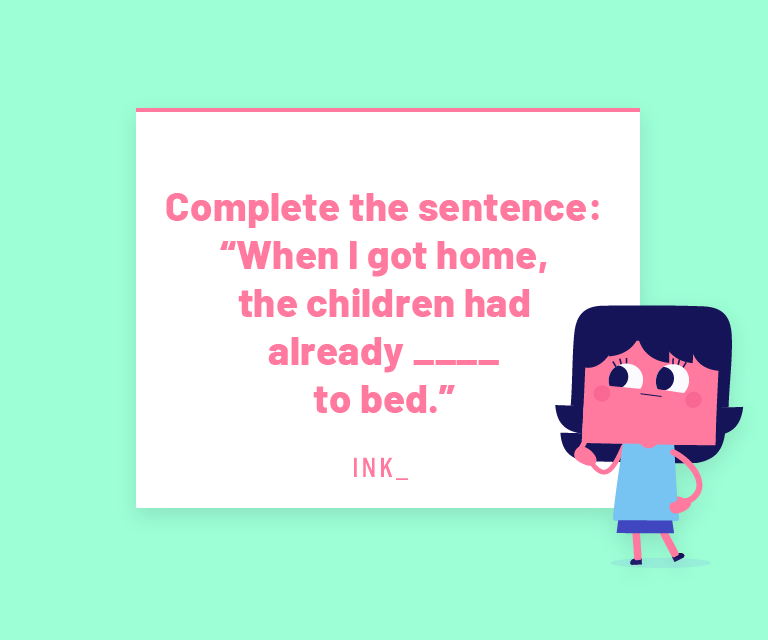

The answer is GONE. The past perfect describes an action that took place before another action in the past.
Past Perfect Tense Question #5
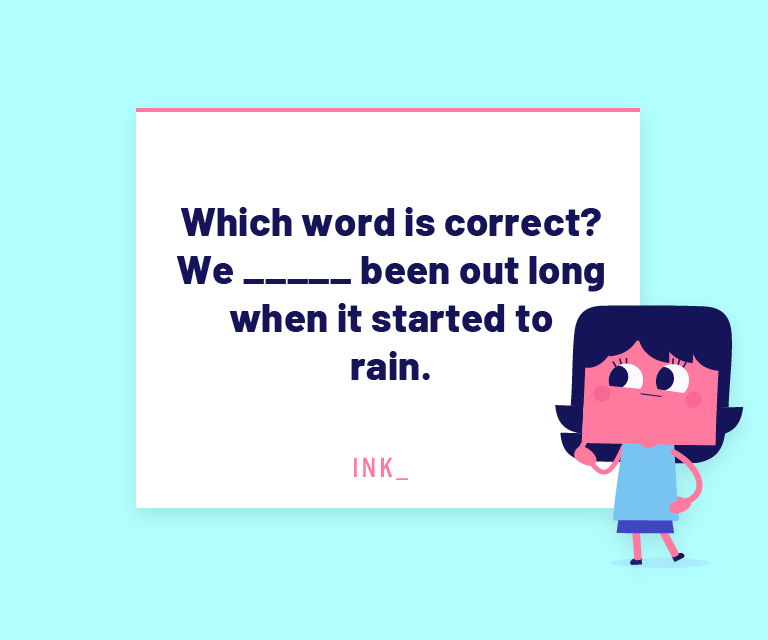

The answer is HADN'T. Make a past perfect negative by adding not between the had and the past participle been.




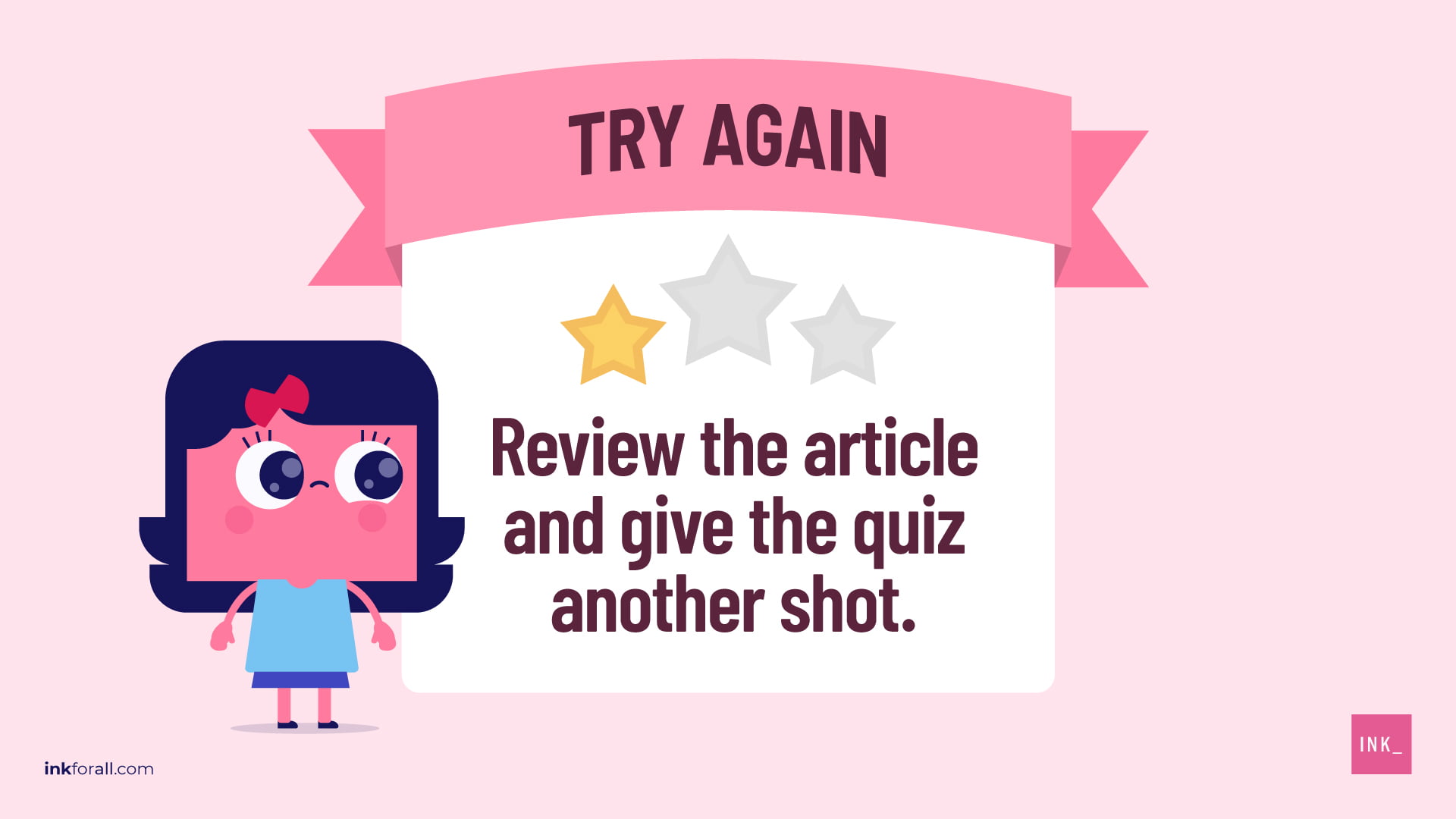


It was so great this information helps a la especially when we are learning another lenguaje
Thank you, Ana! I agree, learning a language is challenge, and we’re happy we can be a positive part of your journey. Thank you again for your beautiful comment!
Thank you very good idia,all tenses you will share.im follow of you
Hello Ezaz! Thank you for reading! We also have an article about verb tenses that you might find helpful as well. Please do check it out. Again, thank you for stopping by and take care!
This was very usefull for me I learned new things in a easy way, thank you.
Hello Ernesto! Thank you for the positive feedback. We’re glad that you found our article helpful. Have a great day!